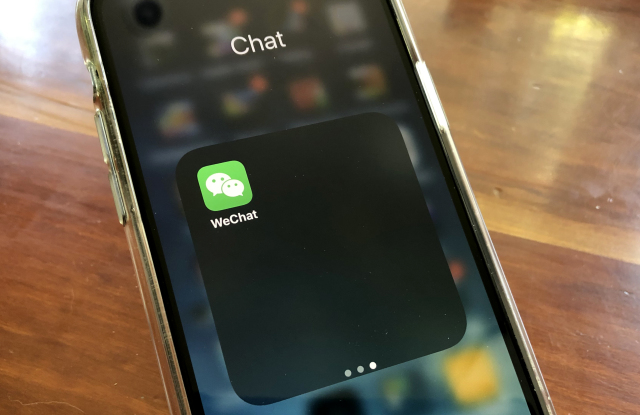Trump’s Looming WeChat Ban Could Complicate Business – WWD
As the tech sector reels from President Trump’s ban on TikTok and WeChat, via a set of executive orders signed Thursday night, the business world is grappling with the implications — especially for the latter app, which has become a pivotal communications pipeline between people and companies between the U.S. and China.
Within its home country, WeChat has become a bedrock of modern life, as 1.2 billion Chinese people rely on it for everything from chatting and sharing photos to shopping, paying bills, sending money to loved ones and catching up on the news. This massive adoption makes it the chat app of choice for expatriates, who see it as a critical link connecting them to their mother country.
That ubiquity and wide feature load also makes it an important pathway for American businesses with global ambitions to reach the massive, high-value Chinese consumer market. China’s e-commerce market is worth nearly $2 trillion, buoyed largely by Alibaba, JD.com and others, including WeChat.
Trump’s move to sever the link has some companies scratching their heads about how deep the implications go. That’s largely due to the fact that his executive order manages to be decisively targeted and vaguely worded.
According to Section 1(a) of the order, “The following actions shall be prohibited beginning 45 days after the date of this order, to the extent permitted under applicable law: any transaction that is related to WeChat by any person, or with respect to any property, subject to the jurisdiction of the United States, with Tencent Holdings Ltd.”
“It becomes a question of whether ‘transactions’ means any kind of interaction, or financial transactions only,” Iris Chan, partner and international client development director at Digital Luxury Group, told WWD. DLG is a marketing firm that represents clients such as Compagnie Financière Richemont and LVMH Moët Hennessy Louis Vuitton brands, Shiseido and others across fashion, beauty, hospitality and more within mainland China.
The definition matters. If the scope covers interactions, including chats between divisions, that could complicate corporate communications. “It specifically says ‘transactions’…but we don’t know what that really is going to entail completely yet,” she said.
Advertising is another vague area. Over the years, global brands interested in reaching the Chinese consumer have flocked to the platform, streaming in from tech to beauty, fashion and luxury. But American companies have only been able to place ads in WeChat since 2017. This looks like it’s ending now.
Or is it? Luxury brands like Tiffany, which is based in New York City, may seem to be disadvantaged compared to, say, Cartier, which is headquartered in Paris. But that overlooks the fact that large brands often have Chinese-based divisions.
Chan doesn’t believe the order extends to Americans’ overseas divisions, but admits that it’s an open question. “How are they going to lean on U.S. companies that have activities in China? That would mean they’re leaning on almost every company, because every company is doing something in China,” she said.
That may or may not be true right now, as it’s not directly outlined in the executive order. So a lot will hinge on how it’s interpreted and how it may be enforced. Either way, it doesn’t rule out the possibility of the White House pressuring executives to control their Chinese counterparts — which is the sort of move that has become a hallmark of the administration. But it would amount to a move that could upend the global operations of U.S. companies across numerous sectors.
It may not matter much to European maisons such as Louis Vuitton, Cartier, Bulgari, Gucci and others that have been connecting and selling through WeChat in recent years. But for fashion houses, beauty brands and other startups and retailers based in places like New York, Los Angeles and San Francisco, confusion and uncertainties abound.
For Tencent, WeChat’s developer, a truly awful outcome would be if U.S. suppliers stop providing hardware to servers that power the app, alongside any of the company’s other operations, according to David Dai, a Hong Kong-based senior research analyst at investment research firm Sanford C. Bernstein & Co.
He described it as “a worst-case scenario” in a research note following the news of the ban. Dai likens it to “a Huawei-like situation,” referring to the U.S.’ previous ban of Chinese telecom company Huawei Technologies Co., which has been blocked from buying American equipment.
But even those effects may be limited.
Consider that Trump singled out WeChat, with no mention of Tencent’s other businesses and investments in the U.S. The company has stakes in electric car company Tesla, influential online forum Reddit and some of the gaming sector’s most popular companies — including “Call of Duty” owner Activision Blizzard and Epic Games. It also owns Los Angeles-based “League of Legends” game developer Riot Games and holds 12 percent of Snap Inc., developer of the Snapchat app.
On its own, Tencent is a massive company with a huge operation. Its market capitalization tops $600 billion, though shares fell some 6 percent Friday on the Hong Kong Stock Exchange.
By comparison, the fate of fellow app non grata TikTok may have less of a direct impact on the market. ByteDance, TikTok’s owner, has a market cap of $78 billion, which is not small, but nowhere near Tencent’s echelon.
Brands and marketers big and small are already preparing back-up plans, if Microsoft doesn’t end up buying TikTok, as it’s now considering, which would force the app to leave the U.S.
Blush Mark, a new fast-fashion, size-inclusive start-up from bridal company Azazie, just saw a spike in traffic on Sunday, thanks to a viral TikTok post that nabbed three million views. But for Ranu Coleman, chief marketing officer of both companies, success doesn’t hinge on just one platform.
The majority of the brand’s influencers use Instagram and TikTok, she told WWD. And while the latter allowed Blush Mark “to really home in on our Gen Z customer base,” she said, “if a ban in the U.S. should happen, most of our brand ambassadors already have strong engagement on Instagram, in addition to other social platforms, and have already been creating engaging content on Instagram’s newest feature, Reels.”
In other words, selectively eradicating WeChat’s footprint in the U.S. doesn’t squash Tencent’s influence here or abroad. And the act of barring TikTok may really only matter in setting a precedent in how social apps everywhere are treated, as noted by Facebook’s Mark Zuckerberg recently in a meeting with all employees.
Altogether, it may leave the impression that these orders are less about protecting American users or keeping Chinese surveillance out of American affairs, and more about launching surgical strikes against Chinese platforms that perform too well here. These actions, if not handled carefully and with due consideration, may not help U.S. companies in the long run. It could actually hurt them.


